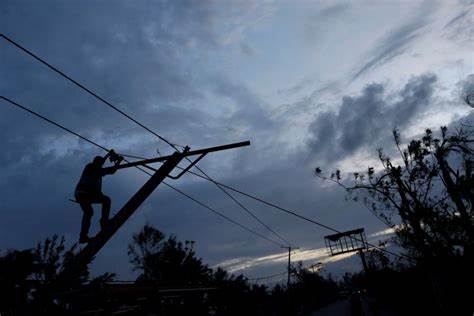Estimated reading time: 3 minutes
A widespread power outage has crippled Haiti’s capital and parts of the country’s central region after protesters forced the shutdown of the Peligre hydroelectric plant — the nation’s largest. The state-owned Electricity of Haiti (EDH) described the blackout as the result of “heinous sabotage” following demonstrations that began Tuesday.
In a statement issued Thursday, EDH confirmed that the plant remains inoperable, resulting in “a total blackout” in Port-au-Prince and surrounding areas dependent on the facility’s power supply. The Peligre plant, situated in the Central Plateau, is a critical source of electricity for the region.
– Advertisement –
The shutdown was triggered by a protest led by the Engaged Citizens Movement, a civil society group accusing the government of abandoning central towns like Mirebalais and Saut d’Eau to violent criminal gangs. Lawyer and activist Robenson Mazarin, the group’s coordinator, defended the protesters’ actions.
“We decided to shut down the hydroelectric plant because the government has abandoned these two towns to the hands of criminal gangs,” Mazarin told AFP. “Authorities refuse to deploy the necessary force to drive out the bandits and restore peace. As long as this situation persists, the production plant will remain closed.”
Since March 31, the Viv Ansanm gang coalition has seized control of Mirebalais, escalating an already dire security crisis. The gang orchestrated a massive jailbreak in which 515 inmates escaped and has since forced the closure of critical institutions, including the Mirebalais University Hospital — one of Haiti’s largest medical centers — on April 23.
More than 85 percent of Port-au-Prince is currently under gang control, with law enforcement often outgunned and outnumbered. Gangs have been accused of committing widespread atrocities, including murder, rape, looting, and mass kidnappings, according to human rights organizations and the United Nations.
Haiti, the poorest country in the Western Hemisphere, is currently governed by a transitional administration amid ongoing political instability. The situation has deteriorated sharply since February, with gangs expanding into areas once considered relatively safe, prompting a humanitarian and security crisis of unprecedented scale.
Despite a partial deployment of a Kenya-led multinational security mission to bolster local police forces, violence continues to surge.
In a recent statement, the United Nations warned that Haiti is nearing “a point of no return,” cautioning that the country risks collapsing into “total chaos” without swift and coordinated international intervention.
Meanwhile, the people of Port-au-Prince face increasingly harsh conditions — no electricity, dwindling access to healthcare, and persistent threats from heavily armed gangs. The power outage only deepens the sense of crisis for a nation already grappling with near-total institutional breakdown.
As of Friday, no timeline has been provided for the reopening of the Peligre plant, and negotiations with the protesters remain uncertain. Haiti’s blackout stands as yet another urgent call for both national action and sustained international support.
Nycaribnews.com



































